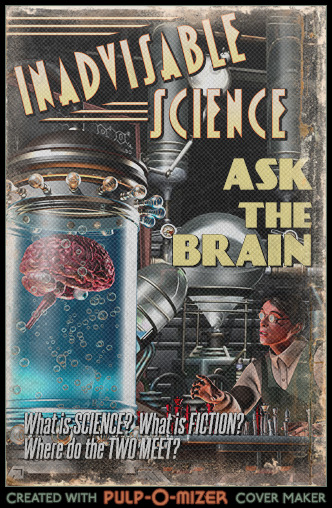What is Science Fiction?
So, I spent my last week on the Oregon coast taking an intense class about writing science fiction. How intense? I missed the fact that the World Series started. I don’t mean I missed the first couple of games, though I did. I mean I had no cognizance that it had started. That was part of the regular world, and my head was, well, off in space.
I won’t bore you with the details of the writing side. But we did have to discuss something that I think is of more general interest: what is science fiction?
Ask a dozen SF fans that question, and you may well get a dozen answers. Some will emphasize the science, others space, others still characters, the future, and so on and so on. The options, and those chosen, say more about the people answering the question than about the genre itself.
Well, maybe that isn’t true. Maybe it points to the flexibility and variability of the genre. Science fiction can be many things for many people. But as far as definitions go, it sucks. We know things by their limitations. Nations define themselves by their borders, oceans by their shores. Not everyone can enumerate Superman’s powers, but everyone knows his weakness is kryptonite.
So where do we look for those limitations? How do we decide the boundaries of science fiction?
For a long time I considered the question ambiguous enough that I stuck to the Damon Knight approach: “science fiction is what I’m pointing at when I say, ‘this is science fiction.’”
But that’s cheating, isn’t it? I mean, it’s not much more productive than saying, “science fiction is what science fiction is.”
Well, as part of the class, we had to have a working definition for science fiction. After all, a score of us were going to be writing three stories over the course of the week (four if you include the one written before we arrived; five, in my case, if you include the extra I ended up writing). If we didn’t start with a definition of the genre, we would risk running far afield in the course of the week.
(How far afield? Well, even with clearly laid out instructions and goals, we still drove the instructor to get out her “cat herder” tee shirt.)
So, in the course of an early discussion, the instructor, Kristine Kathryn Rusch, gave us the definition we would use for the course: “if the science element, however small it might be, is removed from the story, the story no longer works.”
It doesn’t have to be hard science, it doesn’t have to be modern science, and it doesn’t have to be a major element of the story. It’s just that the science element must be there and the story must rely on it. Pull that element out and the story isn’t there. A single quick example: pull the fancy high tech out of Ender’s Game and there’s no way Ender could do what he had to do.
(We did go into more, of course. It was a class about writing science fiction, after all. But still, that was the core of the definition we relied on.)
Now will this definition satisfy all readers? Of course not. Some readers will want science that looks to them as reasonable extrapolations of current science (despite the fact that, over a long enough timeline, we have no idea what changes will come to our knowledge of science). Some will demand strong clarifications of how the science works. Others will care more about whether or not the science of the story comments on humanity.
But you know what? This definition works for me. It gives me the room I need to relax and write science fiction as well as enjoying reading it. And for a writer whose focus has been on fantasy, that’s opening whole new worlds to me.
What more could I ask from a definition?
What do you think? Is that a definition of science fiction that works for you? If not, how would you change it?


